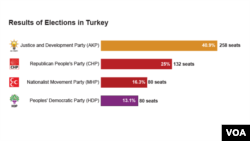Voters handed Turkey's president a stumbling block to his plan to expand his powers when his ruling Justice and Development Party (AKP) failed for the first time to win an outright majority, its biggest setback in 13 years.
Recep Tayyip Erdogan said in a statement Monday "it is of great importance that all the political forces show responsible behavior and the necessary sensitivity to preserve the atmosphere of stability and confidence in our country and our democratic achievements."
The president said, "I believe the results, which do not give the opportunity to any party to form a single-party government, will be assessed healthily and realistically by every party."
AKP lost its absolute majority in parliament Sunday in a stunning electoral defeat for Erdogan's bid to rewrite the country's constitution to create a presidential democracy.
Defeat
Erdogan had been seeking a two-thirds majority in the 550-seat parliament to create a presidential republic. But with virtually all votes tallied, unofficial results showed his Islamic-rooted Justice and Development Party (AKP) winning 41 percent of the vote — well down from the nearly 50 percent it won four years ago.
For the first time, the pro-Kurdish People's Democratic Party (HDP) cleared the 10 percent vote count threshold it needed to join parliament, with some analysts predicting it would seat nearly 75 lawmakers. Those projections triggered celebrations late Sunday in the mainly Kurdish southeastern city of Diyarbakir.
Late Sunday, a politically weakened Prime Minister Ahmet Davutoglu reminded backers that his AKP was still the clear victor. He spoke to supporters in Ankara without acknowledging his party had lost its majority and that it will need to form a coalition for the first time since it came to power 13 years ago.
"Everyone should see that AKP is the victorious party and the winner of these elections," he said. He also warned that no one should try to build a victory from an election they lost.
The main secular opposition Republican People's Party, CHP, won about 25 percent of the vote, while the far-right Nationalist Movement Party, MHP, won a little more than 16 percent.
MHP was poised to take 85 seats in the new parliament, and analysts say it is the most likely to form a government with Erdogan's party.
Referendum on Erdogan's reform plan
Erdogan himself was not on the ballot, but the voting was widely seen as a referendum on whether to give the ruling AKP a super-majority in parliament, with enough AKP lawmakers to rewrite the constitution. Opposition parties campaigned against it.
Changing the constitution would have significantly altered Turkey's democracy and bolstered Erdogan's extended rule as the country's most powerful politician.
Serkan Demirtas, editor-in-chief of the Hurriyet Daily News, said the election results mark the “end of an era.”
"I think it is an end of a period, a long period that the AKP enjoyed ruling the country on its own, because it had always a good parliamentary majority so it could legislate everything. So it seems that this is an end of an era," said Demirtas.







